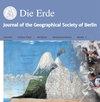从脆弱到恢复:汉斯-乔治·波尔的学术与当代政治生态学
IF 0.6
4区 地球科学
Q3 GEOGRAPHY
引用次数: 15
摘要
我强调波尔对脆弱性的独特方法与我在这篇文章中广泛关注的问题有关,即自他在20世纪90年代初就这一主题撰写文章以来,脆弱性是如何以新颖的方式与其他三个关键词或概念联系在一起的,这些关键词或概念在全球贫困、冲突、城市治理、全球流行病和金融崩溃等许多领域主导着当前的分析和规范工作:即安全、复原力和风险。例如,洛克菲勒基金会主席朱迪思·罗丹的新书《韧性红利》。根据封底上的介绍,她重新调整了基金会,以应对与我们这个相互关联的世界相关的中断、冲击和压力。罗丹说,在这个复杂的时代,快速有效地恢复的能力是一个紧迫的社会和经济问题。弹性的五个特征(2015:14)——意识、多样性、整合、自我调节和适应性——为“适应周期”提供了基石。“适应周期”是一个四阶段模型,整合了布赖恩·霍林(“弹性”)、杰伊·弗雷斯特(“系统思维”)和约瑟夫·熊彼特(“创造性破坏”)的思想。罗丹当然不是个例。在我们这个时代,弹性已经成为一个关键词(Williams 1985),用于理解居住的挑战,以及与人类世的后果一起生活(Schoon 2006)。从这个意义上说,人们可能会说,弹性(以及它的兄弟安全和风险)已经成为当代治理和新自由主义统治的一项强大技术。建设有韧性的个人、社区和机构是21世纪自由主义形式的必要条件。韧性提供了一个不可或缺的路线图,通过它,我们所有人据称都能够预测和容忍居住在一个复杂世界中的干扰、危险和激进的突发事件,再次引用洛克菲勒基金会主席在其新的韧性宣言中的话说,“我们无法预测下一个对我们福祉的重大冲击将在哪里表现出来”(洛克菲勒基金会2013:1)。我想提出的论点是,在将脆弱性纳入目前相当重要的学术产业的过程中,在社会生态复杂性、弹性思维和风险管理的标志下运作,玻尔工作的许多关键优势——辩证的品质——已经失去了。我的重点将放在食物、饥荒和气候问题上——这是汉斯-乔治非常感兴趣的话题,实际上他也发表了大量关于这些话题的文章——以及根据波尔等人提出的脆弱性分析,弹性理论可能会提供什么,也可能不会提供什么。本文章由计算机程序翻译,如有差异,请以英文原文为准。
From Vulnerability to Resilience: Hans-Georg Bohle's Scholarship and Contemporary Political Ecology
My emphasize on Bohle’s distinctive approach to vulnerability is related to the arc of my broad concern in this contribution, namely how vulnerability has since his writings on the topic in the early 1990s has become attached to three other keywords – or concepts – in novel ways that dominate both current analytical and prescriptive work across many domains from global poverty to conflict to urban governance to global pandemics and financial crashes: namely security, resilience and risk. Take for example, the new book by the President of the Rockefeller Foundation, Judith Rodin, entitled The Resilience Dividend . She has, according to the blurb on the back cover, recalibrated the foundation to address the disruptions, shocks and stresses associated with our interconnected world. In this age of complexity says Rodin, the ability to quickly and effectively bounce back is an urgent social and economic issue. The five characteristics of resilience (2015:14) – awareness, diversity, integration, self-regulation and adaptiveness – provide the building blocks of the “adaptive cycle” - a four-phase model integrating the ideas of Brian Holling (“resilience”), Jay Forrester (“systems thinking”) and Joseph Schumpeter (“creative destruction”). Rodin is of course not alone. In our times, resiliency has become a keyword (Williams 1985) for understanding the challenges of inhabiting, and living with the consequences of the Anthropocene (Schoon 2006). In this sense one might say that resiliency (along with its siblings security, and risk) has become a powerful technology of contemporary governance and neoliberal rule. Building resilient persons, communities and institutions is the sine qua non of twenty-first century forms of liberalism. Resilience provides an indispensable road-map by which all of us are purportedly able to anticipate and tolerate the disturbances, dangers and radical contingencies of inhabiting a complex world in which, to again quote the President of the Rockefeller Foundation in its new resilience manifesto, “we cannot predict where the next major shock to our well-being will manifest” (Rockefeller Foundation 2013:1). The argument I want to make is that in incorporating vulnerability into what is now a rather major academic industry operating under the sign of socio-ecological complexity, resilience thinking and risk management, much of the critical edge – the dialectical quality – of Bohle’s work has been lost. My focus will be on issues of food, famine and climate – topics of great interest to Hans-Georg and indeed on which he published extensively – and what resilience theory may, or may not, have to offer in light of the vulnerability analyses of the sort developed by Bohle and others.
求助全文
通过发布文献求助,成功后即可免费获取论文全文。
去求助
来源期刊

Erde
GEOGRAPHY, PHYSICAL-GEOSCIENCES, MULTIDISCIPLINARY
CiteScore
2.90
自引率
6.20%
发文量
0
审稿时长
>12 weeks
期刊介绍:
DIE ERDE is a publication of the Geographical Society of Berlin
DIE ERDE is a scientific journal in Geography, with four issues per year with about 100 pages each. It covers all aspects of geographical research, focusing on both earth system studies and regional contributions.
DIE ERDE invites contributions from any subfield of both Physical and Human Geography as well as from neighbouring disciplines.
 求助内容:
求助内容: 应助结果提醒方式:
应助结果提醒方式:


